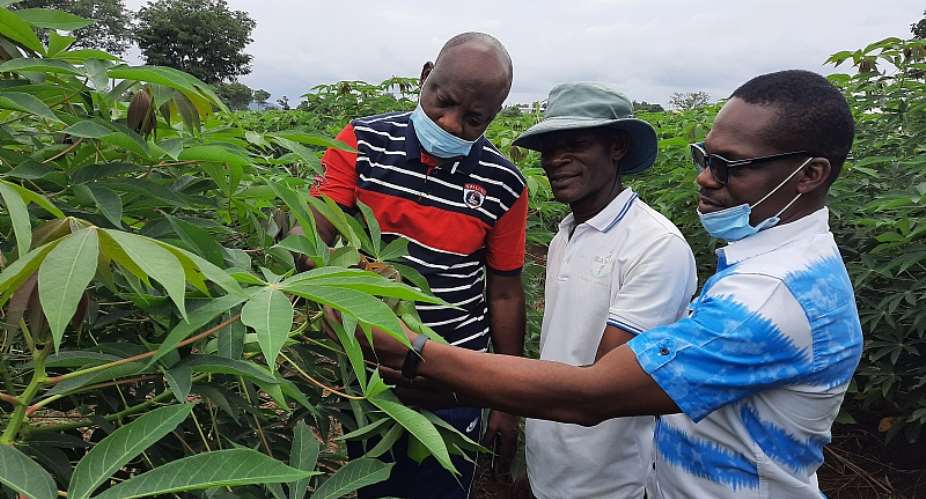The International Institute of Tropical Agriculture (IITA) led Building an Economically Sustainable Integrated Cassava Seed System, Phase 2 (BASICS-II) on Thursday enlisted 45 farmers in Kogi state as Cassava Seed Entrepreneurs (CSEs).
The CSEs were drawn from across the state after a thorough screening process by the Catholic Relief Services (CRS), the BASICS-II partner leading the development of CSEs in Nigeria.
The plan is to help Kogi State boost its seed demand for cassava production, create a new stream of business opportunities, improve the livelihoods of farmers and contribute to the overall food security in the country.
The coming on board of the new cassava seed entrepreneurs will drive the adoption and marketing of the recently branded six released varieties and four yet-to be-released varieties.
The released varieties and their new names were: IBA961632 (Farmer’s Pride), IBA980581 (Dixon), CR36-5 (Ayaya), IBA070593 (Sunshine), IBA980505 (Fine face) and TME 419. The yet-to-be-released (pre-release) varieties and their new names are TMS13F1160P0004 (Game Changer), TMS13F1343P0022 (Obasanjo-2), NR130124 (Hope) and TMEB693 (Poundable).
Under good agronomic practices, these varieties yield more than 20 tons per ha as opposed to the current national average of 9 tons per ha.
Kogi State Commissioner for Agriculture, David Apeh, said the development of cassava seeds system in Kogi state was a welcome development for the transformation of the state’s cassava sector.
“It all starts with the seeds. When you start with bad stems, you end with bad results. Therefore, we appreciate IITA, BASICS-II, and CRS for bringing this project to Kogi state,” Mr Apeh, who was represented by the Director of Agricultural Services, Mr Okolo Ichalla, said.
Prof Lateef Sanni, BASICS-II Project Leader, re-echoed the importance of developing the cassava seed sector to catalyze the diffusion of improved varieties in Nigeria.
He noted that there was a huge opportunity in the cassava seed sector for farmers to utilize and transform their livelihoods, adding that “BASICS-II was willing to backstop farmers towards developing a sustainable cassava seed sector in Nigeria.”
Chairman of the Nigeria Cassava Growers Association, Pastor Paul Agada, said the association was working with the Central Bank of Nigeria to establish 4000 hectares of cassava seed farms. He assured the CSEs of adequate demand and market for improved cassava seeds, stressing that at the moment there was a gap in the availability of clean-improved and certified seeds.
“Our farmers are willing to buy cassava seeds, so we are glad some of you will be producing for farmers in the state,” Mr Agada added.
Though recognized as a major cassava growing state in Nigeria, majority of farmers in Kogi rely on local varieties to grow cassava. This approach undermines the yield of cassava and makes cassava business unprofitable.
Mr Oluwatosin Oni, Senior Program Manager with CRS said the onboarding of the CSEs was a new dawn for the cassava sector in Kogi state.
He expressed optimism that the adoption of BASICS-II model would help Kogi to remain among the top states producing cassava in Nigeria.
About BASICS-II
The five-year Building an Economically Sustainable. Integrated Cassava Seed System, Phase 2, (BASICS-II) project aims to transform the cassava seed sector by promoting the dissemination of improved varieties thereby creating a community of seed entrepreneurs across the cassava value chain. The project will focus on Nigeria and Tanzania with spin off to other African Countries. The project is implemented by the International Institute of Tropical Agriculture (IITA) in collaboration with partners: Mennonite Economic Development Associates (MEDA), National Agricultural Seeds Council (NASC), National Root Crops Research Institute (NRCRI), Catholic Relief Services (CRS), IITA GoSeed, Umudike Seed, Sahel Consulting, Tanzania Agricultural Research Institute (TARI), and Tanzania Official Seed Certification (TOSCI)






 Dumsor: Don't rush to demand timetable; the problem may be temporary — Atik Moha...
Dumsor: Don't rush to demand timetable; the problem may be temporary — Atik Moha...
 Space X Starlink’s satellite broadband approved in Ghana — NCA
Space X Starlink’s satellite broadband approved in Ghana — NCA
 2024 election will be decided on the grounds of the economy; choice of running m...
2024 election will be decided on the grounds of the economy; choice of running m...
 Dumsor: We're demanding less; just give us a timetable — Kwesi Pratt to ECG
Dumsor: We're demanding less; just give us a timetable — Kwesi Pratt to ECG
 Do I have to apologise for doing my security work, I won’t – Simon Osei-Mensah r...
Do I have to apologise for doing my security work, I won’t – Simon Osei-Mensah r...
 All my businesses have collapsed under Akufo-Addo — NDC Central regional chair
All my businesses have collapsed under Akufo-Addo — NDC Central regional chair
 Military, Prison Officers clash in Bawku, three injured
Military, Prison Officers clash in Bawku, three injured
 GRA-SML contract: MFWA files RTI request demanding KPMG report
GRA-SML contract: MFWA files RTI request demanding KPMG report
 Court threatens to call second accused to testify if NDC's Ofosu Ampofo fails to...
Court threatens to call second accused to testify if NDC's Ofosu Ampofo fails to...
 Family accuses hospital of medical negligence, extortion in death of 17-year-old...
Family accuses hospital of medical negligence, extortion in death of 17-year-old...
